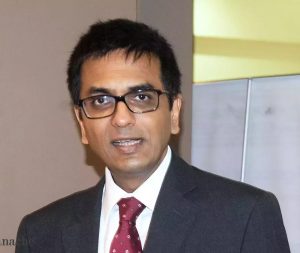CJI Chandrachud calls elections core of Indian democratic set-up, protected by judges reflecting constitutional values

Chief Justice DY Chandrachud has termed the elections as forming the core of the Indian constitutional democracy, while the judiciary played a vital role in this democratic set-up, reflecting a sense of constitutional values.
Addressing the University of Oxford institution on Tuesday on the topic, ‘The humanising role adjudicators can play in a society,’ the top judge of the Indian Supreme Court said that the judiciary reflected a sense of tradition and the future of a good society.
Referring to a question related to the general elections in India, the results of which were declared yesterday, the CJI said that judges were not elected in the country and there was a reason behind this. They reflected a sense of continuity of conditions and constitutional values.
Highlighting the role of technology in injecting greater transparency into the judicial system, CJI Chandrachud said that the judiciary was an instrument of justice that brought order and certainty, while combating the dehumanising effects in a society following a humanising approach towards adjudication.
He said the technological intervention had humanised the process for the parties and the administrative staff of the courts.
The CJI, however, said that he was not a proponent of the complete automation of procedures, noting that the absence of a human mind would remove the human element from the process.
He stressed on the importance of understanding the pros and cons of technological usage to ensure a humanised mechanism of justice. He said artificial Intelligence was replete with unique possibilities for the future.
It must, however, be ensured that guardrails were imposed to control the AI itself and not shift the process of communication from a judge to a robot.
Regarding the ‘unfair’ criticism sometimes aimed at judges on social media, the CJI asserted that the overall impact of technology was to help the judiciary reach out to a wider section of society.
The CJI, when asked whether he faced any political or societal pressure while handing down judgements, said that he has never faced a sense of ‘political pressure’ from the powers that be in his 24 years as a judge.
CJI Chandrachud said the judges lived lives which were relatively isolated from the political arm of the government. However, they had to be conversant with the impact of their decisions on the polity at large. It was not a political pressure but an understanding by the court of the likely impact of a decision, he added.
The audience, which included students from Oxford, asked him about the Special Marriage Act judgment delivered by the Supreme Court, which ruled against legalising same-sex marriage in India last year.
The CJI said he was not going to defend the judgment because as a judge, he believed that once a verdict was delivered, it became the property of not just the nation but global humanity.
The Special Marriage Act was a law enacted by Parliament, which contemplated a marriage in a heterosexual relationship, he said, adding that he was in the minority in that case in a certain specific aspect as he was in favour of recognising civil unions for same-sex couples ‘until such time’ as Parliament stepped in.
The CJI said three of his colleagues did not agree with his opinion in the matter because they felt even the recognition of same-sex unions was beyond the purview of the court.
He said in modern democracies, what happened in courts should not really be looked at in terms of the substantive outcomes of the case.
The CJI said a court was involved in a continuous process of dialogue, not only with the litigating parties, but with civil society.
He said this was the main motivation behind his decision to livestream important constitutional cases.
It was the need of the hour to take the process of justice and the administration of law to the homes and the hearts of people, added the CJI.
from India Legal https://ift.tt/9J67Vef